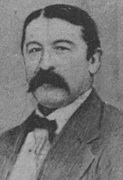
An Irish immigrant who was the last person to be hanged in Rhode Island in the US was this week pardoned more than 150 years after his death.
John Gordon was hanged in downtown Providence on Si Valentine’s Day in 1845 at the age of 29 after he was convicted for the killing of Amasa Sprague, the brother of a US senator. On Wednesday, 166 years on, the governor of the US state of Rhode Island pardoned Gordon following what is believed to have been a tainted trial.
Law professors and historians now say the evidence against Gordon was circumstantial and his trial was tainted by widespread bigotry against Irish Catholics. While the location of Gordon’s birth in Ireland is not known, it is believed he joined his brothers Nicholas and William in Rhode Island in 1843, where they ran a general store and tavern near the mill owned by Amasa Sprague. It is thought that the Gordons’ liquor licence was revoked at the request of Sprague, who raised is sue with his workers buying alcohol and turning up at the mill drunk.
The body of Amasa Sprague was later found near Pocasset River. He had a bullet in one arm and a fractured skull.
John Gordon and his brothers were arrested. The trial lasted nine days and included more than 100 witnesses. Red stains on a coat turned out to be dye and a prostitue who gave evidence could not identify the brothers.
Historians later found that she had worked for the brother of one of the trial’s judges.
Nicholas and William were cleared.
However after deliberating for 75 minutes, the jury found John guilty of murder. He tried to appeal the conviction but was hanged on February 14, 1845,from the gallows at Providence Jail.
He told those gathered: “I forgive them. I forgive all my persecutors, because they did not know what they were doing. I hope all good Chris tians pray for me.”
Irish immigrants protested ell across New England and thousands took part in Gordon’s funeral procession.
On Wednesday, the governor of the US state of Rhode Island, Lincoln Chafee signed a proclamation pardoning John Gordon at the Old State House, in Providence, where Gordon’s trial took place.
He was joined by Rep. Peter F. Martin, who sponsored the House resolution recommending that the Governor grant a pardon, and Senate Judiciary Committee Chairman Sen. Michael J. McCaffrey, who sponsored the Senate version.
The public defender’s office, historians, the American Civil Liberties Union and the Catholic Diocese of Providence were among those who called for the pardon.
Peter Martin said: “I was brought up understanding two things. That the Irish endured prejudice here and that a young man hanged for a murder he did not commit.”
“Governor Chafee’s pardon of John Gordon acknowledges the failures of our state’s past and corrects the historical record,” Chairman McCaffrey said. “In so doing our state is reaffirming the sanctity of the constitutional right to a fair trial for everyone, regardless of religion, ethnicity, heritage, race, or any other characteristic.”
In 1852, just seven years after Gordon’s hanging, and in large part because of it, Rhode Island became the second state in the US to abolish capital punishment.
![[Irish Republican News]](https://republican-news.org/graphics/title_gifs/rn.gif)
![[Irish Republican News]](https://republican-news.org/graphics/title_gifs/harp.gif)

